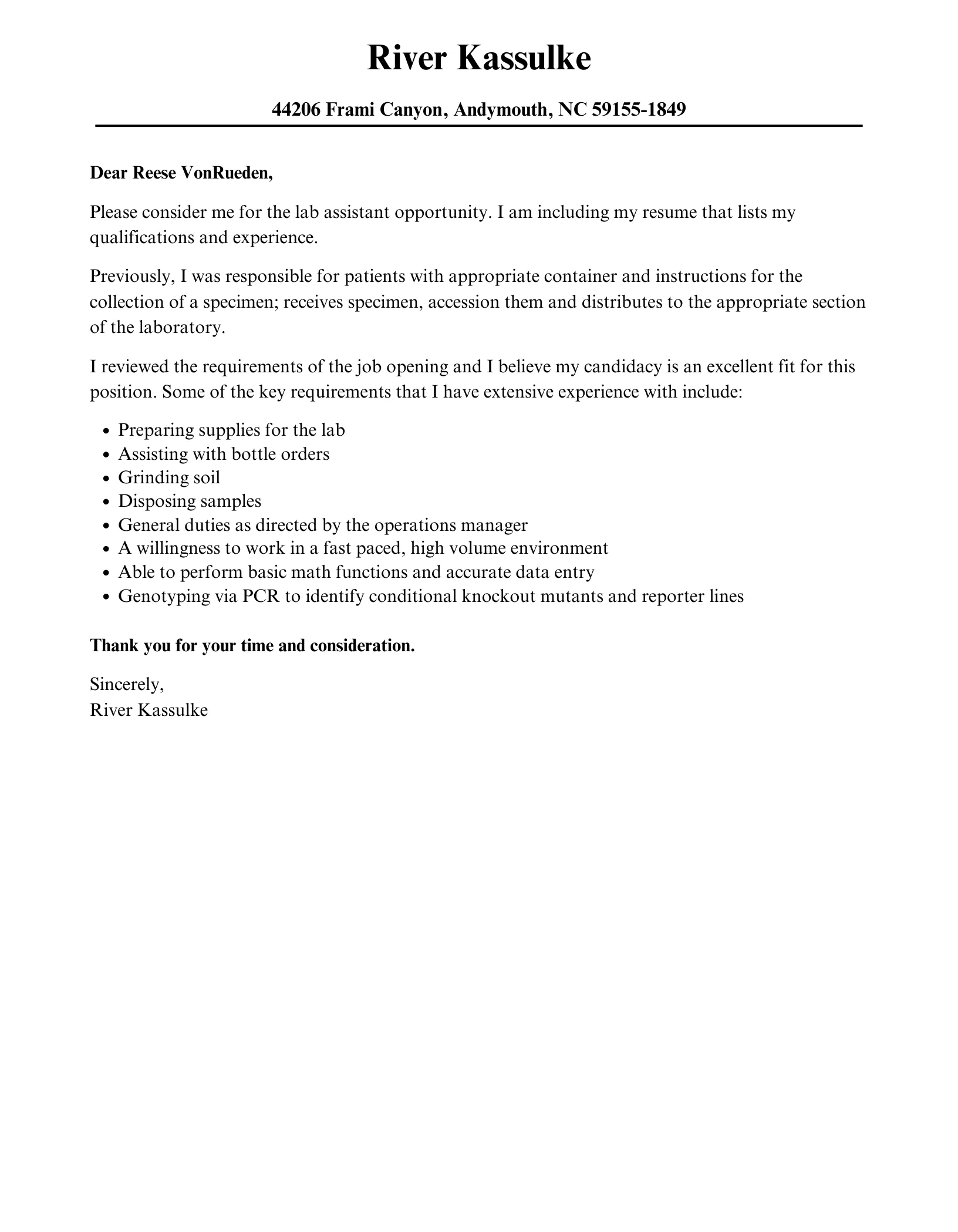Why a Strong Lab Assistant Cover Letter Matters
In the competitive field of laboratory science, a compelling cover letter is your initial introduction to potential employers. It’s more than just a formality; it’s a crucial tool that showcases your personality, enthusiasm, and suitability for the role. A well-crafted lab assistant cover letter distinguishes you from other applicants and highlights your most relevant skills and experiences. It complements your resume by providing context, explaining your career goals, and expressing your passion for scientific exploration. Without a strong cover letter, your application may be overlooked, even if you possess the required qualifications. It’s your opportunity to make a memorable first impression and increase your chances of securing an interview. Remember, a well-written cover letter demonstrates professionalism, attention to detail, and your ability to communicate effectively, all essential attributes for a lab assistant position. So, invest time and effort in crafting a cover letter that truly reflects your capabilities and aspirations.
Highlighting Your Lab Skills
Your cover letter should prominently feature your technical and soft skills. This section is crucial for demonstrating your competence and ability to excel in the laboratory environment. It should reflect a balance of technical abilities and interpersonal skills, highlighting your comprehensive understanding of lab protocols and your aptitude for collaboration and communication. Be specific in detailing the types of experiments you’ve performed, the equipment you’ve utilized, and the data analysis methods you’re familiar with. Mention your experience with specific techniques, instruments, and software relevant to the job. Also, it’s important to illustrate how you have applied these skills in previous roles and what results you have achieved. Showcasing your laboratory skills in a clear and concise manner will significantly increase your appeal to potential employers.
Technical Skills for Lab Assistants
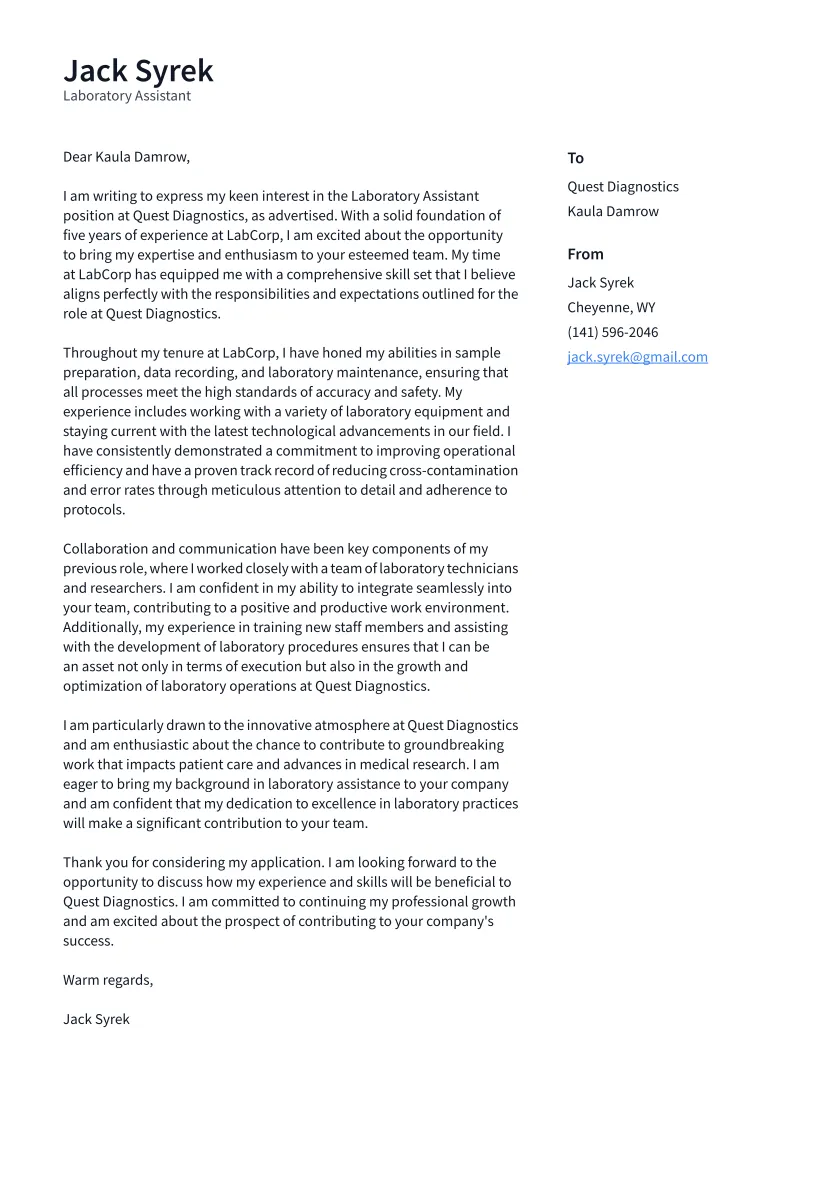
Technical skills form the backbone of a lab assistant’s capabilities. These include practical expertise in lab procedures and the ability to operate and maintain lab equipment. In your cover letter, highlight your proficiency in core lab techniques such as sample preparation, cell culture, and microscopy. Be sure to mention experience with common laboratory tests and assays. Mention your ability to handle hazardous materials safely and your understanding of laboratory safety protocols. Demonstrate your skill in accurate data recording, analysis, and interpretation. Detail any experience with specific software or laboratory information management systems. Highlighting a diverse set of technical skills will prove your versatility and readiness to contribute immediately to the lab’s operations. Use concise statements to showcase your specific competencies, ensuring the hiring manager can quickly assess your fit for the role.
Lab Equipment Proficiency
Proficiency with lab equipment is a critical skill for lab assistants. Your cover letter should emphasize your familiarity with various instruments and machines. Mention your experience with specific pieces of equipment such as centrifuges, spectrophotometers, and PCR machines. Describe your ability to operate, calibrate, and maintain equipment according to established protocols. Demonstrate a clear understanding of the principles behind each instrument and your capability to troubleshoot basic issues. Showcase your familiarity with equipment manuals and safety guidelines. Highlighting your hands-on experience and equipment knowledge will demonstrate that you’re able to contribute to the lab’s daily functions effectively. It’s also wise to include instances of when you’ve properly maintained equipment, which underscores your ability to contribute immediately.
Data Analysis Abilities
Data analysis abilities are increasingly vital in modern labs. Your cover letter should show your capacity to collect, analyze, and interpret experimental data accurately. Highlight your proficiency with relevant software and statistical methods, such as Excel, SPSS, or R. Detail your experience in generating graphs, tables, and reports. Demonstrate your understanding of statistical principles and your ability to draw valid conclusions from data. Include examples of how you’ve used data analysis to support research findings or improve lab processes. Strong data analysis skills illustrate your analytical abilities and your capacity to contribute to research projects effectively. Showing these skills will make you a stronger candidate.
Communication and Teamwork in the Lab
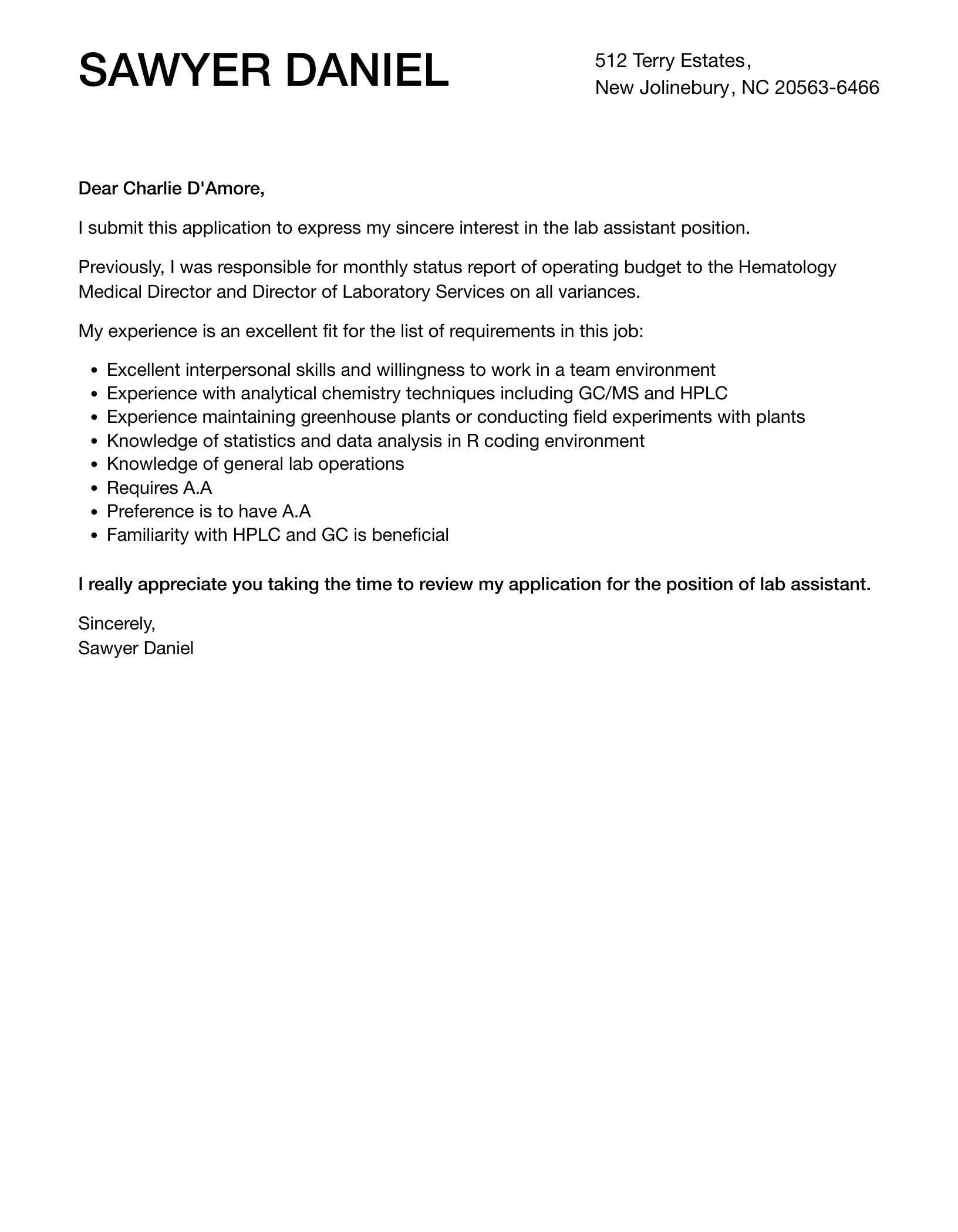
Effective communication and teamwork are essential for a successful lab assistant. Highlight your ability to collaborate with colleagues, share information clearly, and contribute positively to the lab environment. Describe instances where you’ve successfully worked in teams to complete projects or solve problems. Mention your experience communicating scientific findings through reports, presentations, or discussions. Demonstrate your proficiency in following instructions, providing feedback, and maintaining open communication with supervisors and peers. Strong interpersonal skills will demonstrate your potential to thrive in a collaborative setting. Highlighting your teamwork skills will show that you work well in a team environment.
Demonstrating Your Soft Skills
Soft skills, which include non-technical abilities, are incredibly important to highlight within your cover letter. These skills define how you interact with colleagues, manage tasks, and approach challenges. Detail your capacity to manage time effectively and prioritize tasks, ensuring deadlines are met. Highlight your problem-solving abilities, showcasing your critical thinking and adaptability. Present your organizational skills, especially your capacity to manage tasks and laboratory space efficiently. Illustrate your ability to learn quickly and adapt to new procedures or technologies. Showing a good blend of technical and soft skills will distinguish your capabilities. Soft skills often make the difference between a good and a great lab assistant.
Attention to Detail and Accuracy
Attention to detail and accuracy are paramount in any laboratory setting. Demonstrate your ability to follow protocols precisely and maintain a high standard of accuracy in your work. Mention any experiences where you ensured the integrity of results by adhering to stringent procedures. Showcase your ability to identify and correct errors promptly. Include examples of how you’ve maintained accurate records and documented procedures. Highlight your commitment to quality control and your understanding of the importance of minimizing errors. Highlighting these skills will show you understand how important it is to follow protocol within a lab.
Problem-Solving and Critical Thinking
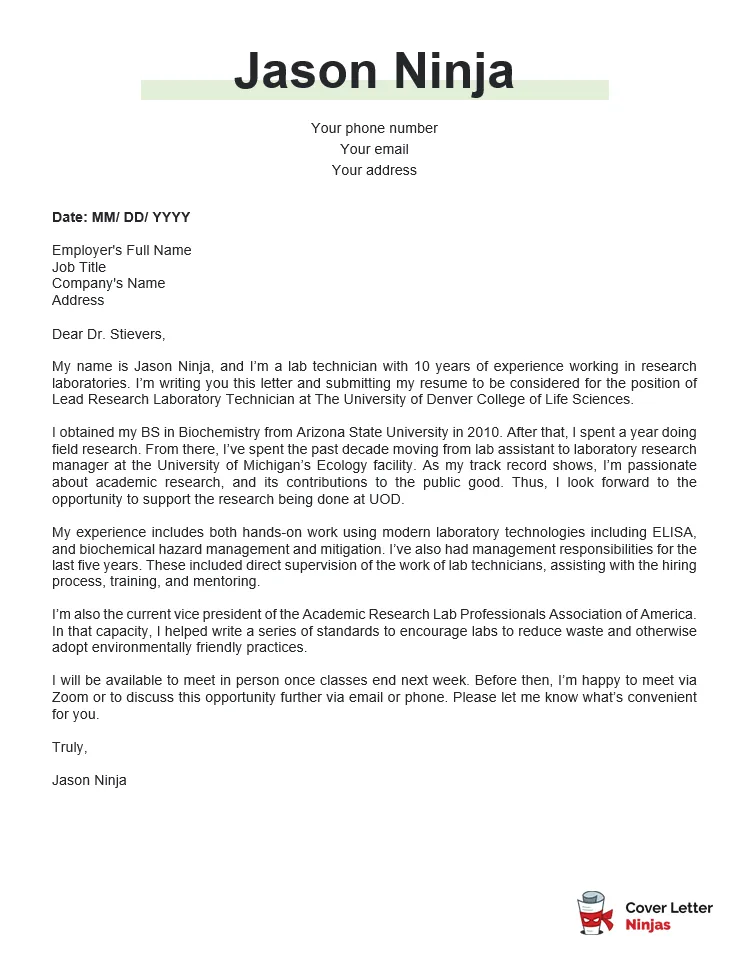
Problem-solving and critical thinking skills enable you to address challenges and contribute to the lab’s efficiency. Provide specific examples of how you’ve identified and resolved issues in a lab setting. Demonstrate your ability to analyze problems, propose solutions, and implement effective strategies. Showcase your capacity to troubleshoot equipment, interpret data discrepancies, or adjust procedures as needed. Mention any instances of innovative thinking that resulted in improvements. Highlighting these skills proves that you’re a proactive, resourceful, and valuable asset to the lab team. These are important for the smooth function of any lab.
Formatting Your Lab Assistant Cover Letter
A well-formatted cover letter is easier for employers to read and evaluate. A clean and organized cover letter is easier to read and increases the chance of it being reviewed thoroughly. Focus on making the letter visually appealing and easy to navigate. Avoid long paragraphs and use clear, concise language. Use proper spacing and formatting to enhance readability. Organize the content logically, with clear headings and subheadings. Make sure the font is professional and easy to read. By applying these principles, you can ensure your cover letter is not only informative but also easy for a hiring manager to read and appreciate.
Header and Contact Information
The header of your cover letter must include your name, contact information, and the date. This information should be placed at the top of the document. Include your full name, phone number, email address, and professional online profiles like LinkedIn. Make sure your contact information is accurate and up-to-date. Include the date when you send the application. If known, include the name and title of the hiring manager. Your header should be well-organized and easy to locate. Including this information is a must and shows professionalism.
The Opening Paragraph Hook
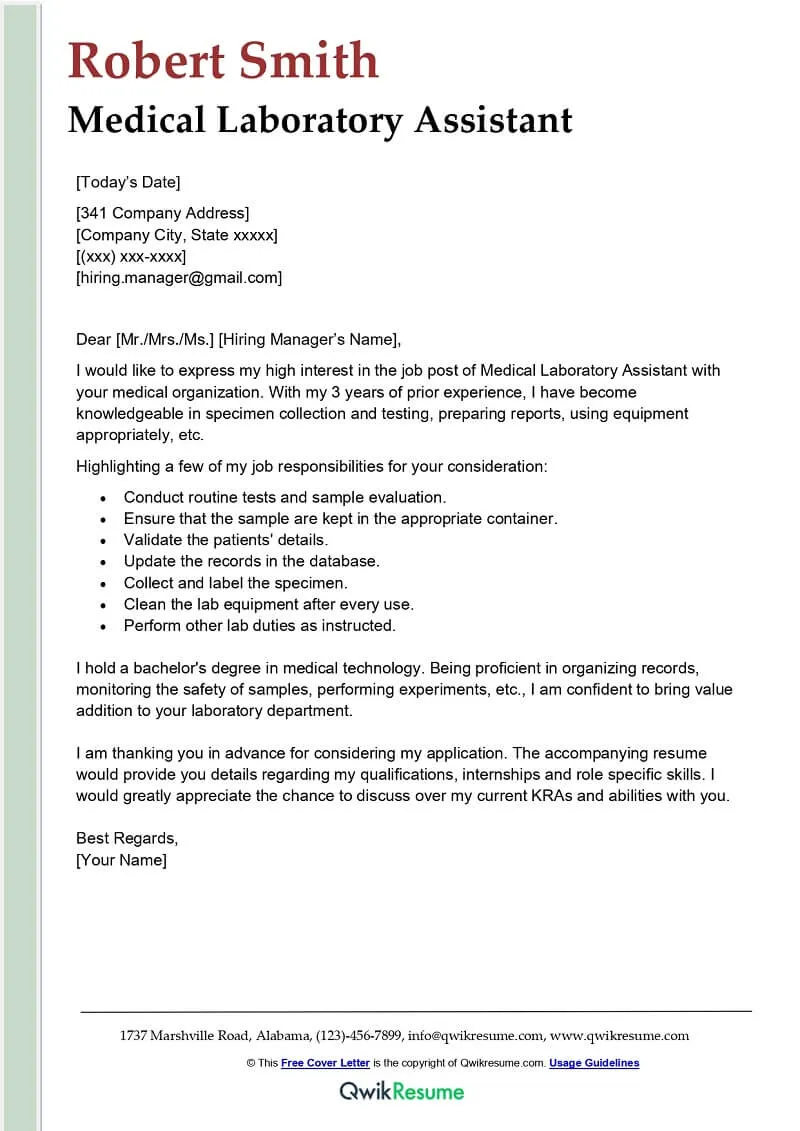
The opening paragraph is your chance to grab the reader’s attention and express your interest in the position. Start with a compelling statement that reflects your enthusiasm and understanding of the role. Mention how you found the job posting and briefly state why you are interested in working for that specific company or lab. Summarize your relevant skills and experience in a concise manner to create a good initial impression. Aim to show your enthusiasm for the position, and ensure the reader knows why you are a good fit for the job.
Body Paragraphs Showcasing Skills
The body paragraphs are where you detail your skills, experiences, and achievements. Each paragraph should focus on a specific set of skills or experiences relevant to the job description. Use specific examples to demonstrate your abilities, such as completed projects, tasks, and duties. Quantify your accomplishments where possible, and use action verbs to describe your responsibilities. Include details about your technical and soft skills, aligning them with the needs of the position. Make sure to tailor your cover letter to the specific requirements of the job description, showing why you’re a perfect fit for that particular lab. Be clear, concise, and focused.
Tailoring to the Job Description
Customize your cover letter to align with the job description. Examine the job requirements and the desired qualifications, and modify your cover letter accordingly. Focus on the skills and experiences that are most relevant to the position. Use the keywords from the job description to highlight your skills, ensuring you meet the stated requirements. Mention any specific projects, techniques, or equipment mentioned in the job description. Doing this demonstrates that you have read the job posting and are aware of the requirements, which increases your chances of landing an interview.
Closing Your Lab Assistant Cover Letter
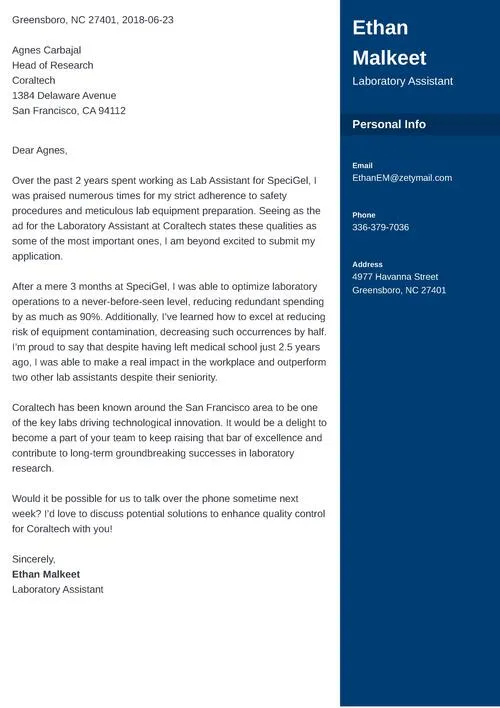
Conclude your cover letter with a strong closing paragraph that reiterates your interest in the position and summarizes your qualifications. Reiterate your appreciation for the opportunity and express your desire to discuss your application further. Include a call to action, such as inviting the hiring manager to contact you for an interview. Maintain a professional tone and thank the reader for their time and consideration. Properly closing your cover letter will leave a positive impression on the reader.
Proofreading and Editing
Proofread and edit your cover letter carefully before submitting it. Check for grammar, spelling, and punctuation errors, as any mistakes can undermine your professionalism. Read the letter aloud to identify any awkward phrasing or unclear sentences. Have someone else review your cover letter for feedback. Pay attention to consistency in formatting and style. Ensure your cover letter is free of typos and errors. Your cover letter should be impeccable. You want to show the hiring manager you are detail-oriented.
Common Mistakes to Avoid
Avoiding common mistakes helps ensure your cover letter makes a positive impression. Be aware of the common errors that job seekers make in their applications. Avoid using a generic template and personalize the letter. Do not include excessive information or irrelevant details. Avoid spelling and grammar mistakes, and be clear in your language. Tailor your cover letter to the job description and highlight the most relevant skills. Avoiding these common errors increases your chances of success.
Lack of Specifics and Achievements
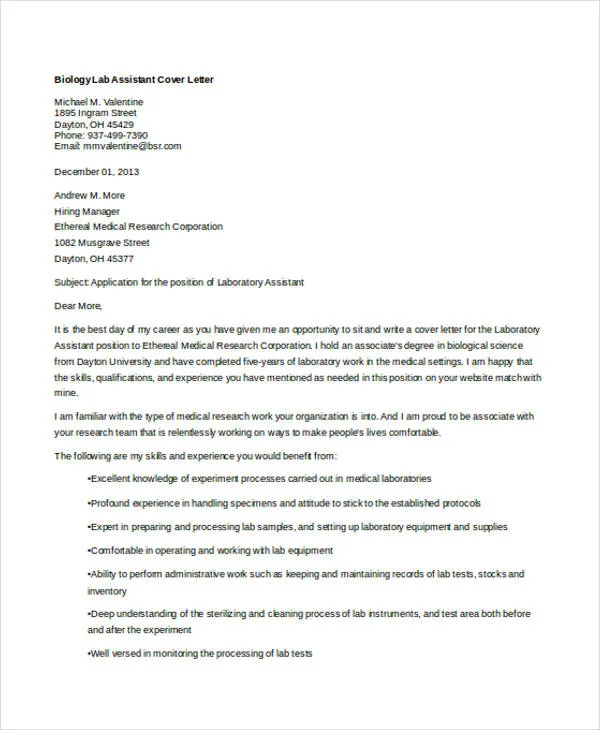
Avoid vague statements and generic descriptions. Use concrete examples and detailed descriptions of your accomplishments. Quantify your results and provide specific examples of your skills and experience. Avoid statements that cannot be substantiated. Always back up your claims with specific achievements. Providing specifics is more impactful and creates a clearer picture of your capabilities.
Generic Cover Letter Templates
Avoid the use of generic cover letter templates. Customize each cover letter to fit the specific job and company. Make sure you tailor your letter to the requirements of each position. Show your enthusiasm for the specific role. Personalize your letter and make it unique to your own experiences and the job requirements. Using a template can show a lack of effort and may cause your application to be overlooked.
Submitting Your Lab Assistant Application
Before submitting your application, be sure to review your cover letter and resume. Make sure the documents are error-free and formatted properly. Follow the instructions provided in the job posting for application submission. Submit your application before the deadline. Save a copy of the submitted cover letter and resume for your records. Make sure all of your files are properly named. Following these steps will help you make a positive impression and increase your chances of getting hired. Good luck with your lab assistant job search!
